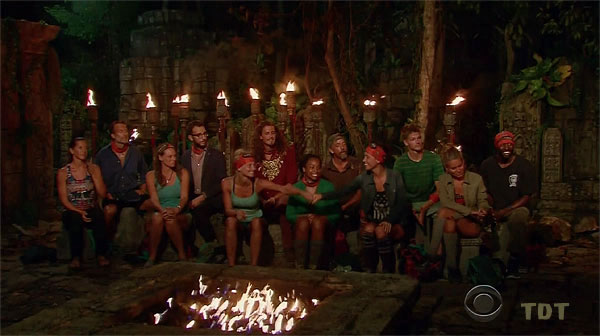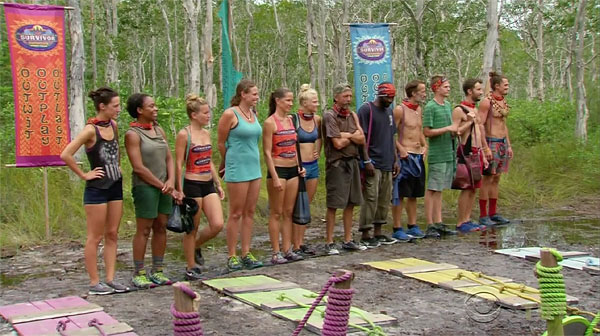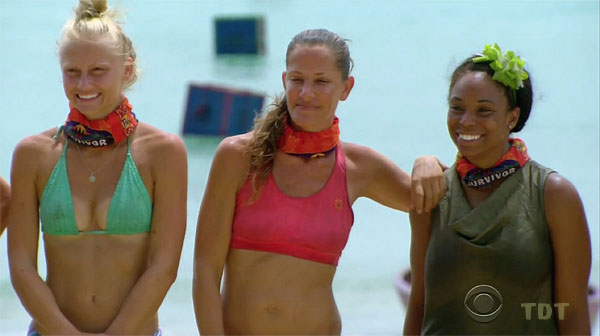

This season just doesn’t stop impressing. Oh sure, a second straight ball-centered immunity challenge bogged this episode down, but, man, we’re seeing some great gaming in Cambodia.
I honestly thought this week would bring us our first truly boring episode, one that saw Ciera hit the road in the first very predictable boot. But, nope, all we got is the finest episode so far in an unbelievable and consistently strong season.
Now, let’s get down to some theoretically informed analysis. Usually when I write these, I apply the theory as a way of explaining how a singular contestant enacted a move that affected the boot off. And while I’m going to give Ciera credit this week, we could also just as easily give Jeff Probst credit.
What do I mean? Well, let’s talk about priming theory. We’re going back to the ol’ social psychology well on this one. Basically, priming details the process by which introducing one piece of information to someone impacts how they interpret another piece of information. This seems complicated, but it’s not. It’s all about the nodes in our brains.
Let me give you an example of sorts from my own research. Most of my research, as I’ve mentioned, revolves around how the media constructs its stories, and what influences that process. But I’ve also done a fair amount of work in the field of race and sports. Basically, many scholars have found that sports journalists and broadcasters use stereotypical descriptors when describing athletes of different races. These descriptors aren’t negative; they’re just different depending on race. So, for example, if you read about an athlete being intelligent, more likely than not that athlete is white. If you read about an athlete being strong, more likely than not that athlete is black. Researchers have found that journalists and broadcasters use about 12 different stereotypes consistently when describing white or black athletes.
But what I look at is if actual regular people now hold those stereotypes because of media depictions. So they study how media characterizes athletes and I study whether regular people apply stereotypes. And to study this, I use priming.
So, for example, in the experiment I linked to above, some co-workers and I put our participants into two groups. Each group saw a photo of a baseball player, read a paragraph about the player that basically said the player was intelligent, and then asked them to rate the player’s intelligence. It’s a little more complicated than this, but you get the idea: See a photo, read a paragraph telling you something, then rate the player on that something. One group saw a photo of black player, read the paragraph and answered the question. One group saw a photo of a white player, read the same paragraph and answered the same question.
In this example, the participants were primed by the photo. They saw a white or black player and this information (race of the player) or stimulus, conjured up information in the cognitive networks (their nodes, or brain) about athletes and affected how they would interpret the following paragraph and questions. If they weren’t primed by the photo, the two groups would have answered the questions the same way. But because we primed them with race, we found that people applied stereotypes. So even though participants read the same paragraph and answered the same questions, they rated the black player as less intelligent. This is because of cultural stereotypes propagated by the media. We were able to measure this because we primed the participants.
Priming’s been used in psychology studies for a very long time. Of course, you don’t tell the participant you’re priming them because you want them to answer questions about something without knowing what you’re trying to measure. If they knew, they could think about their answers.

What does this have to do with this week’s episode of Survivor? Well, I would argue today’s contestants have been primed, especially by Jeff Probst, to think they need to make Big Moves™. Ciera has been told, over and over again, how great of a player she is because of the Big Moves™ she made last year, voting out Mommy and going to rocks.
If you think back to the early and middle seasons of Survivor, nobody talked about big moves. You didn’t need them to win. Heck, even last year, what Big Move™ did Mike make? Did Denise make a Big Move™ in Philippines?
Yes, sometimes big moves make a big difference, but they don’t always. And winners don’t have to make them. But they sure they do make for great TV.
And that’s why Probst always talks about needing them to win, despite loads of evidence to the contrary. So contestants have that in the back of their minds; they think they need to make a big move, even if it could ultimately hurt their games.
For the last couple weeks, we’ve seen Ciera drone on and on about wanting to make big moves, which she basically defines as the only way to win. Heck, at tribal, she’s basically implied if you don’t make a big move this early, you’re not playing to win. That’s patently ridiculous.

But these contestants have been primed to think they need a big move. So even if they’re in a good spot, like Stephen right now, they’re running around trying to make that move. Though one could argue that campaigning so much and so often against Joe is only hurting Stephen. Or, for Kelley, obviously using her idol was the right play, but jumping up and down and taunting the others, basically flaunting the Big Move™, is that a good move this early? With that move and Ciera’s nonstop blathering about big moves, both have made sure they’re far bigger targets than Abi-Maria and likely to be on the chopping block even before many of the alpha males.
The Big Move™ has become a huge, integral part of the game even though there’s really no evidence that you need one, as opposed to many subtle, smart moves. But, this season, Ciera’s been priming everyone. And, over time, Probst has been doing the same. And that priming, that big move talk, is now in the back of people’s minds (in a node) and it’s activated when new stimulus like a tribal council is presented to them.
That’s it for this week’s theory time. We’re done with the psychology lesson. Let’s talk remaining contestants:
Orkun

- 1. Spencer — What a turnaround. In Cagayan, Spencer kept barely avoiding the vote out. And that’s how this season started too. But, amazingly, the dude finds himself in a really good spot right now. He’s good at challenges, but not nearly as much of a threat as others. And he’s got some decent allies and will become a good chess piece once the main Bayon core start picking each other off. Give Spencer props for this. I don’t know if he’s playing a great game, but it’s definitely good.
- 2. Ciera — Ciera voted her mom off. She went to rocks. How do I know this? Because she keeps on implicitly talking about it over and over. You’d think that these moves led to her victory by how proudly she talks about “playing to win.” It’s like she forgot that she lost her season. And her big moves mattered little. I have to admit, she’s bothering me the last couple episodes. I can’t stand that she’s whining that others aren’t doing things to help her. All this big move stuff is about others not playing to win, in Ciera’s mind. But it’s really about others not playing for Ciera to win.
- 3. Abi-Maria — Purple Abi just keeps rolling, popping up every so often to taunt and call others Debbie Downers. You gotta love the Abi-Maria. Nobody makes hypocrisy more entertaining. In all honesty, she seems to be playing a decent game all of a sudden. I mean, she can’t win, but she’s doing a good job seemingly blending in.
 4. Kelly — I was watching the episode on Wednesday and Probst brought everyone in for the reward challenge and the weirdest thing happened. He started talking about how the challenge was run during the Borneo season and Kelly Wiglesworth competed and lost to Gervase. All of a sudden, Probst was like, “How did that feel Wiglesworth?” And, man, I am not lying when all of a sudden, there was Kelly Wiglesworth. They flew her to Cambodia just to compete in this challenge! I was amazed. I don’t think she’s still in the game though because it would be unfair for a contestant to first show up on Day 20 and play the rest of the game.
4. Kelly — I was watching the episode on Wednesday and Probst brought everyone in for the reward challenge and the weirdest thing happened. He started talking about how the challenge was run during the Borneo season and Kelly Wiglesworth competed and lost to Gervase. All of a sudden, Probst was like, “How did that feel Wiglesworth?” And, man, I am not lying when all of a sudden, there was Kelly Wiglesworth. They flew her to Cambodia just to compete in this challenge! I was amazed. I don’t think she’s still in the game though because it would be unfair for a contestant to first show up on Day 20 and play the rest of the game.- 5. Joe — Even if Joe doesn’t win a million bucks, he’s going to win whatever prize they give to folks who generate the most hashtags. And that’s got to be comforting to the Man Bun. And, again, every week he surprises me a bit more with his play. But, I have to say, I’m not sure focusing on Stephen is a good move. Take out folks who can beat you at immunities, Man Bun.
 6. Kelley — Great idol play. Great. Bad taunting. She’s now a target. I feel like the end game is now approaching for Kelley. I sure hope not, though. She still gives great confessional and is playing a heck of a game.
6. Kelley — Great idol play. Great. Bad taunting. She’s now a target. I feel like the end game is now approaching for Kelley. I sure hope not, though. She still gives great confessional and is playing a heck of a game. - 7. Keith — Do you think Keith spit while he was driving? Do you think the spit hit someone like Kimmi in the face? I think so. I don’t know if you know: Keith loves to spit. And I love Keith.
- 8. Jeremy — The way Jeremy smoothly made sure his alliance backed off voting for Stephen was a thing of beauty. Nobody mentions Jeremy as a threat. Nobody. Stephen, a great strategist even, thinks of Joe as his Moby Dick. But isn’t it beyond clear that Jeremy is the new JT?
- 9. Stephen — I have to admit, if after 20 days I lost a challenge that would have given me coffee, I would have cried. Heck, if this morning I lost an opportunity to get coffee, I would have cried. I need my coffee. Don’t take it from me or I’ll vote you off, um, my life?
- 10. Kimmi — Kimmi’s settling into the background. She’s going to be needed when Bayon crumbles and it’s going to take her, I bet, to about the final five. I don’t know if she has the move in her to take someone like Jeremy out, but she’s playing an under-the-radar game and doing it quite well.
- 11. Tasha — I’m not sure how much longer Tasha has in this game. I’ve said it before, she’s playing a hell of a game, but I just have this feeling it’s not going to last. I don’t know why, but I feel like she’s the next target of the Kelley-Ciera-Abi contingent that’s bound to bring in a couple more players. I hope not, though.
 Pat Ferrucci started watching Survivor when episode two of Borneo first aired. He’s seen every episode since. Besides recapping here, he’ll be live-tweeting this season from the Mountain Time Zone. Why? Because nobody cares about the Mountain Time Zone except when they want to ski. Follow him @patferrucci for Survivor stuff and tweets about anything and everything that enters his feeble mind.
Pat Ferrucci started watching Survivor when episode two of Borneo first aired. He’s seen every episode since. Besides recapping here, he’ll be live-tweeting this season from the Mountain Time Zone. Why? Because nobody cares about the Mountain Time Zone except when they want to ski. Follow him @patferrucci for Survivor stuff and tweets about anything and everything that enters his feeble mind.
- Index of articles
- Pre-season preview
- Ep.1: Vytas, SIT down
- Ep.2: Varner teaches the Old School
- Ep.3: Tasha sets the Tribal agenda
- Ep.4: Abi continues cultivating an irrational gameplan
- Ep.5: Let's get ethical
- Ep.6: Follow the leader... or not
- Ep.7: Framing how it all went down
- Ep.8: Second Chance primed for an incredible end game
- Ep.9: Did Stephen just open or close the gate to winning?
- Eps.10-11: Construction junction, how do you function?
- Ep.12: Spiraling toward what could be an amazing end
- Ep.13: Planning behavior before the finale
- Ep.14: Wrapping up a stellar season